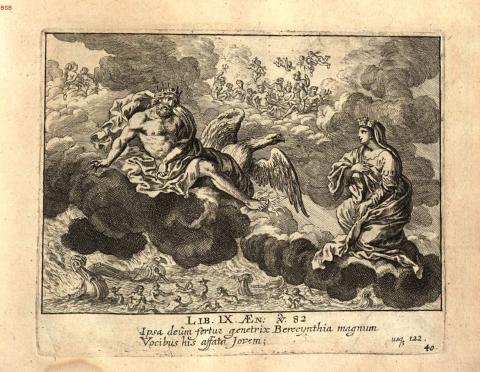Annotations
In the clouds of Olympus Berecynthia kneels (with a city crown) pleading before Jupiter (with an eagle); beneath nymphs splash around vessels in the sea.
In den Wolken des Olymp kniet Berecynthia (mit Mauerkrone) bittend vor Jupiter (mit Adler); unten Schiffe mit im Meer sich tummelnden Nymphen. (Suerbaum)
Engraving from a German children’s picture-book version of the Aeneid by G. J. Lang and G. C. Eimmart, “A tapestry of Roman virtues as seen in Vergil’s Aeneas and his brave deeds, rendered in sparkling engravings, as illustrations of the remarkable deeds of antiquity, for the common benefit of noble youth,” (Peplus virtutum Romanarum in Aenea Virgiliano eiusque rebus fortiter gestis, ad maiorem antiquitatis et rerum lucem, communi iuventutis sacratae bono, aere renitens) (Nuremburg: J.L. Buggel, 1688), pl. 40.


This engraving depicts a flashback in Book IX when Berecynthia, the mother of the gods, approached Jupiter as Aeneas was building his fleet from timber felled on Mount Ida. She asked that those ships should be saved, as their wood was taken from her favorite mountain grove. What Jupiter points to below their clouds is the ‘present’ moment in Book IX: Turnus has attacked the Trojan fleet and set it alight, but instead of burning the ships have sunk and remerged as sea nymphs. Jupiter wears a crown, as king of the gods, and is accompanied by his eagle, while Berecynthia wears a crown in the shape of a city. This is reference to normal classical depictions of Magna Mater. In the background sit the rest of the gods. From right to left, Neptune is discernible with his triton, Ares by his helmet and spear, Diana with her half moon coronet, and Mercury with his caduceus. (Lucy McInerney)